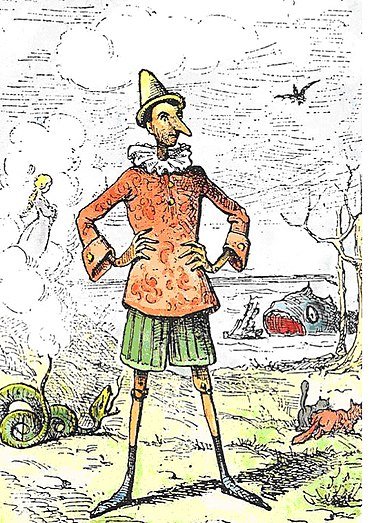The story of Pinocchio
Some words of one of my favirite stories from when i was a kid.

Most of us have heard the story of Pinocchio or watched it as a Disney cartoon. Translated into more than 200 languages and dialects, the most translated book after the Bible and the Koran, it continues to this day to be translated and adapted, to inspire fields of art, to be commented on for its extratextual applications.
Carlo Collodi's marionette first appeared in the Italian children's newspaper "Il Giornale dei Bambini" on July 7, 1881, and until January 25, 1883, the well-known work was published in sequels. In the first fifteen chapters it is entitled "Story of a Puppet" (Italian: Storia di un burattino) and, after a break of about five months, it continues under the name "The Adventures of Pinocchio". Under this title, in 1883, the work was published as a book with a novel plot for children.
Carlo Lorenzini was born in Florence in November 1826 and died at the age of 64. He chose the nickname Collodi from his mother's place of origin, where Pinocchio's Park has now been created. Being the child of a large and unfortunate family, he had nine other siblings, six of whom died early. His mother worked as a maid and his father was a cook. Active in political matters, he was the founder of the satirical newspaper Il Lampione (The Lampstand) and engaged in the composition of satirical plays and stories. After the creation of the Kingdom of Italy, in 1861, he stopped being involved in politics and turned to writing children's books.
The original text was changed a lot in order to get Pinocchio the ticket to success. Carlo Collodi originally did not intend the story to be aimed at children, but at adults. For this reason, in the first part of his play, Pinocchio dies hanging from a tree because of his countless mistakes and lies, while his father, Geppetto, also dies in prison. At the urging of his publisher, however, the talented writer changed the story in its second part and adapted it to the context of children's literature. He did this by introducing into his story the fairy, who saved Pinocchio from death by transforming him from a puppet into a real boy. Since then, the fairy also plays the role of mother figure.
On the other hand, Geppetto expresses deep paternal love, anguish and concern for Pinocchio, he is ready to give his life for him. Geppetto initially wants to make a puppet for himself "to go around the world with it, to take out a piece of dry cloth and a glass of wine". Throughout the narrative unfolds essentially the eternal conflict and the difficulty of the relationship between father and son. Pinocchio, like all children, as much as he seeks his freedom, has moments when he needs the protection of the family.
The story of the naughty little kid will gain world fame after the famous article by the French thinker and critic Paul Hazard in 1914 in the magazine "Revue des deux mondes", and after the equally famous "Elogio di Pinocchio" by the Italian Pietro Pancrazi in 1921. From then it steadily gathers the interest of scholars and writers from all over the world. Certainly, Pinocchio is not the only fairy tale that tells us about good and evil, but it is one of the rare cases where the protagonist possesses both and fights with himself so that this unique element prevails which will make him a "real boy" or otherwise a hero with heart and soul.
Although the work is purely didactic, it remains relevant because it does not fall into the traps of pretend moral teaching. Through various inventive tricks, such as fairies, puppets that come to life and talking animals, the harsh reality of life is presented. The need for food, shelter and the aspects of everyday life are a basic motif of the story. And that's one of the reasons that made it a classic. The greatness lies both in the freedom and in the caustic, between serious and funny, representation of the world, in the satire of human types, social classes, institutions and problems that parade and alternate in each of Pinocchio's adventures, setting the plot in constant motion and upheaval. Because the world that revolves around Pinocchio is often inhospitable, incapable or weak.
Congratulations @giotists! You received a personal badge!
You can view your badges on your board and compare yourself to others in the Ranking
Check out our last posts:
Support the HiveBuzz project. Vote for our proposal!